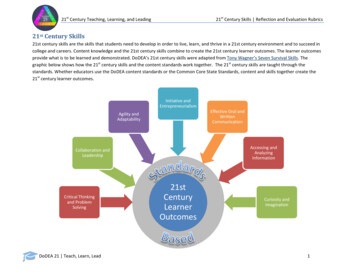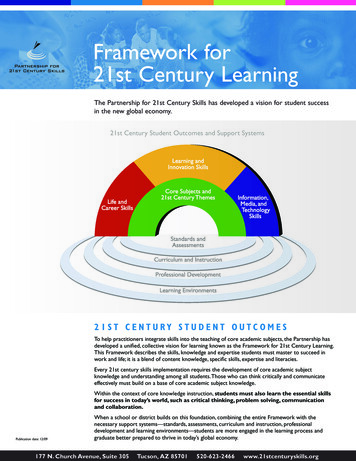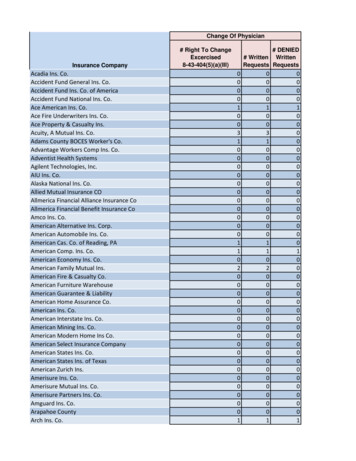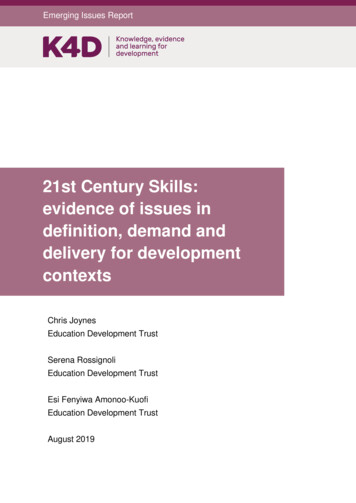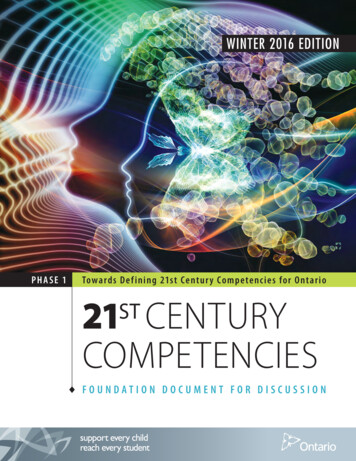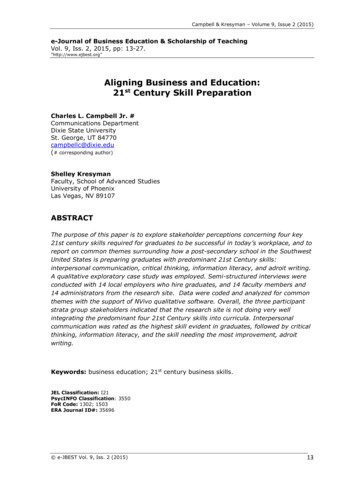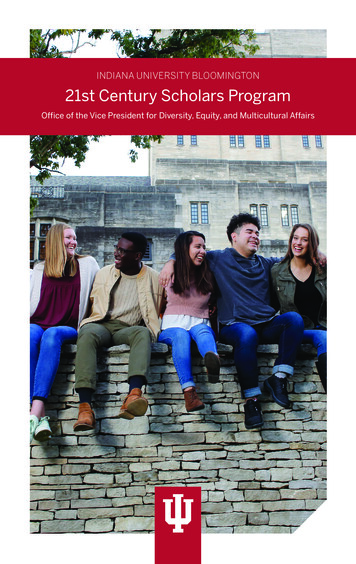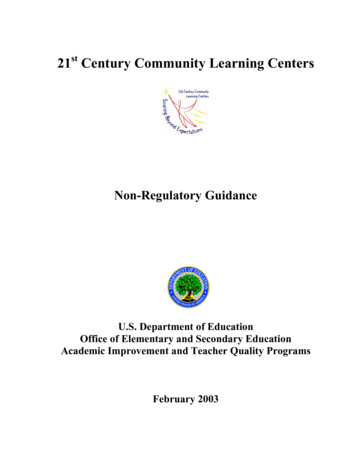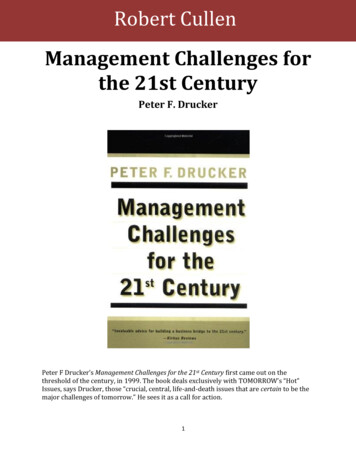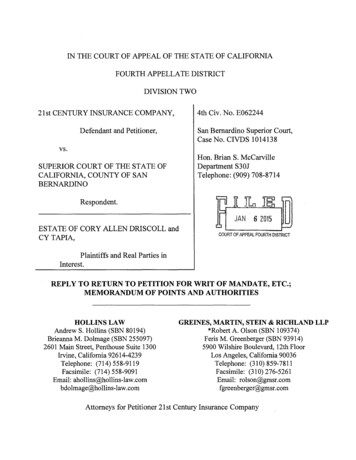
Transcription
IN THE COURT OF APPEAL OF THE STATE OF CALIFORNIAFOURTH APPELLATE DISTRICTDIVISION TWO4th Civ. No. E06224421st CENTURY INSURANCE COMPANY,Defendant and Petitioner,San Bernardino Superior Court,Case No. CIVDS 1014138vs.Hon. Brian S. McCarvilleDepartment S30JTelephone: (909) 708-8714SUPERIOR COURT OF THE STATE OFCALIFORNIA, COUNTY OF SANBERNARDINORespondent.ESTATE OF CORY ALLEN DRISCOLL andCY TAPIA,COURT OF APPEAL FOURTH DISTRICTPlaintiffs and Real Parties inInterest.REPLY TO RETURN TO PETITION FOR WRIT OF MANDATE, ETC.;MEMORANDUM OF POINTS AND AUTHORITIESHOLLINS LAWAndrew S. Hollins (SBN 80194)Brieanna M. Delmage (SBN 255097)2601 Main Street, Penthouse Suite 1300Irvine, California 92614-4239Telephone: (714) 558-9119Facsimile: (714) 558-9091Email: EINES, MARTIN, STEIN & RICHLAND LLP*Robert A. Olson (SBN 109374)Feris M. Greenberger (SBN 93914)5900 Wilshire Boulevard, 12th FloorLos Angeles, California 90036Telephone: (310) 859-7811Facsimile: (310) 276-5261Email: rolson@gmsr.comfgreenberger@gmsr.comAttorneys for Petitioner 21st Century Insurance Company
TABLE OF CONTENTSPageINTRODUCTION1MEMORANDUM OF POINTS AND AUTHORITIES3I.PLAINTIFFS ADMIT THAT TAPIA WAS BEINGDEFENDED. UNDER HAMILTON, A CARRIER, EVENONE THAT UNREASONABLY DECLINESSETTLEMENT, DOES NOT CAUSE AND IS NOTLIABLE FOR THE INSURED'S SELF-INFLICTEDJUDGMENT LIABILITY WHEN A DEFENDED INSUREDSETTLES WITHOUT THE CARRIER'S CONSENT.As 21st Century Was Defending Its Insured, HamiltonApplies.3Risely v. lnterinsurance Exchange of the AutomobileClub Does Not Apply And, In Any Event, Is Wrong.5Objecting To A Settlement Is Not Participating In It.6PLAINTIFFS' ACTION FAILS AS A MATTER OF LAWBECAUSE 21st CENTURY SATISFIED ITS DEFENSEOBLIGATIONS UNDER THE ONLY APPLICABLEINSURANCE POLICY.7A.B.c.II.3A.B.The Language In The Two Other Policies IsEstablished By Uncontradicted Evidence.721st Century's Volunteered Payments Did Not CreateA Duty To Defend Where None Otherwise Existed.9CONCLUSIONCERTIFICATE OF COMPLIANCE911
TABLE OF AUTHORITIESPage(s)CasesDart Industries, Inc. v. Commercial Union Insurance Co.,(2002) 28 Cal.4th 1059Hamilton v. Maryland Casualty Co.,(2002) 27 Cal.4th 71881-7, 9Howard v. Omni Hotels Management Corp.,(2012) 203 Cal.App.4th 4038Johnson v. Alameda County Medical Center,(2012) 205 Cal.App.4th 5218Risely v. Interinsurance Exchange of the Automobile Club,(2010) 183 Cal.App.4th 196Wint v. Fidelity & Casualty Co.,(1973) 9 Cal.3d 2572, 55StatuteCivil. Code,section 2860, subdivision (b)4,511
INTRODUCTIONThe return does not answer the three questions that this Court posedin its November 18, 2014, order:1."[T]he effect on any additional duty to defend under thedisputed policies of Cy Tapia's deposition testimony to the effect that thevehicle involved in the accident was available for his regular use";2."[I]fthe duty to defend under the aunt's and grandmother'spolicies no longer existed at the time of the settlement, whether Hamilton v.Maryland Casualty Co. (2002) 27 Cal.4th 718 applies"; and3."[W]hether the copies of the insurance policies in question,authenticated as coming from petitioner's files, were sufficient to prove thelanguage of the policies in the absence of any showing that they are notcorrect copies[.]"The return has no response to the first two questions. As to the third,it obfuscates and speculates. It goes on at length casting aspersions aboutexemplar copies of the aunt's and grandmother's insurance policies that21st Century authenticated as coming from its files, but never comes togrips with the fact that the only evidence was that they were true and correctcopies of the policies actually issued.The return's treatment of the Court's authentication question isemblematic of its overall approach: It is long-winded and tries to achieveits ends by obfuscation rather than any force of logic; it is opposition bydistraction and focus on irrelevancies.1
We do not wish to burden the Court with unnecessary repetition, butgiven the return's attempt at distraction it is helpful to focus on the essentialand critical facts here: The return admits that 21st Century was defending its insured,Tapia, when he settled. (Return 10 [ 8, admitting Petition 8].)The return admits that Tapia settled without 21st Century'sconsent and over its objection and opposition. (Return 14Petition [ 23, admitting23].)Hamilton is clear: A carrier is not liable for a settlement itsinsured makes over its objection when the carrier is defending the insured. To the extent that Risely v. lnterinsurance Exchange of theAutomobile Club (2010) 183 Cal.App.4th 196, creates an exception toHamilton, it (1) is wrong as inconsistent with Hamilton; and (2) doesn'tapply here, as the exception is limited to a failure to defend under a policywith a greater policy limit, not, as here, policies with much lower policylimits. Risely would not apply in any event, as there was no failure todefend under the aunt's or grandmother's policy, since no defense wasowed. The return proffers no argument suggesting there was coverageunder either the aunt's or grandmother's policy if the policy language is as21st Century established. 21st Century's evidence on the subject of thepolicy language, in fact, issued is uncontroverted. Making voluntaryindemnity payments in an attempt to dispel a potential dispute does notcreate a duty to defend where there never was one.The writ should be issued as prayed for.2
MEMORANDUM OF POINTS AND AUTHORITIESI.PLAINTIFFS ADMIT THAT TAPIA WAS BEINGDEFENDED. UNDER HAMILTON, A CARRIER, EVENONE THAT UNREASONABLY DECLINESSETTLEMENT, DOES NOT CAUSE AND IS NOTLIABLE FOR THE INSURED'S SELF-INFLICTEDJUDGMENT LIABILITY WHEN A DEFENDEDINSURED SETTLES WITHOUT THE CARRIER'SCONSENT.A.As 21st Century Was Defending Its Insured, HamiltonApplies.The return admits that 21st Century defended the insured, Tapia, inthe underlying action. (Return 10[ 8, admitting Petition 8, which states,"21st Century acknowledged coverage and defended Tapia under theMcGuire policy"].) That brings this case squarely under the holding inHamilton v. Maryland Casualty Co. (2002) 27 Cal.4th 718.Under Hamilton, an insured who is being defended cannot settlewithout the carrier's consent. Why? Because unless and until there is alitigated judgment, one does not and cannot know whether the carrier'ssettlement conduct (even if it was derelict in one or more respects, e.g.,refusing a reasonable settlement offer) caused the insured any damage.(See Petition 17-19, 25-32.) When you can't prove causation, you can't winyour case. When the plaintiff can't win, the defendant is entitled tosummary judgment.3
It doesn't matter whether the defense here was or should have beenprovided under the additional policies as well or whether the 150,000settlement offer would have resolved the entire underlying litigation or onlyCory Driscoll's claim. Hamilton precludes unauthorized settlement evenwhere the carrier has acted unreasonably. (Hamilton v. Maryland CasualtyCo., supra, 27 Cal.4th at p. 731.) That makes an irrelevancy of plaintiffs'claim that 21st Century forwent a 150,000 settlement offer (whether or notthat offer, in fact, would have resolved the entire underlying litigation).(Return 15-18, 45-52; see Petition 12.) Hamilton's point is that whether thedefending carrier has acted reasonably or not regarding settlement, the handhas to be played out at trial before there is causation. (Hamilton, supra, 27Cal.4th at pp. 722, 726, 731.)The return's effort to identify other supposed wrongdoing on21st Century's part does not change the calculus. Much of what the returnargues is simply that 21st Century stood in the way of an early settlement.But that is just a recasting of the Hamilton failure-to-accept-a-reasonablesettlement-offer circumstance.The other claim is 21st Century's supposed failure to provide Tapiawith independent Cumis/Civil Code section 2860 counsel. (Return 53-54.)But that does and should affect only whether 21st Century could ultimatelyhold on to its reserved rights. The facts remain undisputed that21st Century was defending Tapia and that Tapia settled without21st Century's consent. In any event, Civil Code section 2860 was notbrought into play by the possibility (even likelihood) of a judgmentexceeding policy limits. That is not a conflict triggering a right to4
independent counsel: "No conflict of interest shall be . deemed to existsolely because an insured is sued for an amount in excess of the insurancepolicy limits." (Civ. Code,§ 2860, subd. (b).)B.Risely v. lnterinsurance Exchange of the Automobile ClubDoes Not Apply And, In Any Event, Is Wrong.As expected, the return relies on Risely v. Interinsurance Exchangeof the Automobile Club (2010) 183 Cal.App.4th 196, which held that aninsurer's defense under one policy but failure to defend under anotherpolicy with a much greater limit is equivalent to no defense at all. (SeeReturn 24, 40-42.) But as previously explained, Risely is both factuallydistinguishable from the present case (see Petition 33-34) and simply wrong(see Petition 34-38). The return does not dispute that Risely isdistinguishable because the carrier there was not defending under a policywith much higher limits, and here the claimed other policies had muchlower limits (even when combined).The return, like Risely, relies on Wint v. Fidelity & Casualty Co.(1973) 9 Cal.3d 257, 263. (Return 40-41; see Risely, supra, 183Cal.App.4th at p. 211.) But as explained in the petition, Wint doesn't helpplaintiffs' position because (a) there the only defending carrier settled andstopped defending, so there was no ongoing defense (unlike here), and (b)Wint predates Hamilton, and accordingly, to the extent inconsistent, issuperseded by it. (Petition 35-36.) Risely's reliance on Wint is unjustified.Even on its own facts, Risely is at odds with Hamilton. But Risely isirrelevant, by its own terms, to the facts here.5
C.Objecting To A Settlement Is Not Participating In It.Finally, the return tries to escape Hamilton by insisting that materialfactual issues remain as to whether 21st Century participated in thesettlement. (Return 44-45.) Plaintiffs are grasping at straws. Imaginarystraws, at that. Plaintiffs admit paragraph 23 of the petition, which statesthat "21st Century's objection/lack of consent was clear and unmistakable"and quotes 21st Century's letter informing Tapia that 21st Centuryadamantly opposed his accepting the CCP 998 offers. (Return 14["Plaintiffs admit the allegations in paragraph 23"]; see Petition 13.) Thatis not "participating" in a settlement. Under plaintiffs' construct, had21st Century remained silent, it would not have participated in thesettlement, but by voicing its objections it did. That makes no sense.Nor did 21st Century "participate" because it appointed and paiddefense counsel. Defense counsel, even defense counsel retained by thecarrier, doesn't speak for the carrier where the carrier expressly opposes asettlement that defense counsel recommends. (See Petition 29-31.)* * *Bottom line: Hamilton is clear. 21st Century was providing Tapia adefense in the underlying action. When he settled without 21st Century'sconsent (indeed, over its express objection), that was his sole responsibility.21st Century, accordingly, is entitled to judgment.6
II.PLAINTIFFS' ACTION FAILS AS A MATTER OFLAW BECAUSE 21st CENTURY SATISFIED ITSDEFENSE OBLIGATIONS UNDER THE ONLYAPPLICABLE INSURANCE POLICY.As just discussed, it really doesn't matter whether 21st Century oweda defense under the aunt's (Leith) or grandmother's (Velasquez) policies,because it defended its insured, Tapia, under the sister's (McGuire) policyand Hamilton precluded him, while being defended, from settling without21st Century's consent. But the policy language established by theuncontradicted evidence and the undisputed facts here are clear that21st Century did not even owe its insured Tapia a defense under the Leithor Velasquez policies. (See Petition 39-45.)A.The Language In The Two Other Policies Is EstablishedBy Uncontradicted Evidence.Plaintiffs speculate at length that the policy language in the Leith orVelasquez policies might be other than what the uncontradicted evidenceestablishes. (Return 2-3, 31-32.) What the return does not say is important.It never disputes thatif the policy language says what 21st Century asserts itdoes, then there is no coverage. It does not dispute that Tapia regularlyused the vehicle or that as such his use of that vehicle was excluded fromcoverage. The petition demonstrated in detail why there can be no coverageunder the aunt's or grandmother's policies. (Petition 40-42.) In a nutshell,Tapia isn't a named insured under either policy; neither policy lists as acovered vehicle the Ford Ranger that he drove in the accident; it is beyonddispute at this point (as, indeed, this Court noted in its November 18 order)7
that the Ford Ranger was available for his regular use; and in order for thereto be coverage under either policy, it had to not be available for his regularuse. The return does attempt to distract by asserting that the aunt andgrandmother may also have used the vehicle, but that does not negate thefact that Tapia regularly used it.Rather, the return's sole attack is to claim that 21st Century'sevidence is insufficient to prove the policy terms. It does so, again, byobfuscation. 21st Century offered evidence of the actual languageemployed by the policies as issued. (1 Exh. 126-127; see Petition 39-40.)That evidence was of exact policy language found in the specific policyfiles. That it was by exemplar language did not make it any less exacting.The same declarant testified to the same thing in his deposition. (4 Exh.887-890.) This is precisely how the Supreme Court has said policylanguage can be proven. (See Petition 5, 20, 40, discussing Dart Industries,Inc. v. Commercial Union Ins. Co. (2002) 28 Cal.4th 1059, 1069-1070.)Plaintiffs stress that because policy language can change over time,one can never know beyond a shadow of a doubt whether the claim-fileexemplars are accurate. (Return 2-3, 12, 20, 31-33.) But that is not thestandard. It isn't countervailing evidence, either; it's mere speculation andinnuendo. (E.g., Johnson v. Alameda County Medical Center (2012) 205Cal.App.4th 521, 528 [speculation insufficient to defeat summaryjudgment]; Howard v. Omni Hotels Management Corp. (2012) 203Cal.App.4th 403, 421 [same].)8
Only the McGuire policy provided potential coverage, and21st Century defended and otherwise fully discharged its obligations underthat policy. (See Petition 42-43.)B.21st Century's Volunteered Payments Did Not Create ADuty To Defend Where None Otherwise Existed.The return insists at length that 21st Century must have oweddefense and coverage under Leith and Velasquez policies because it paidthe indemnity limits of those policies toward the judgment. (Return 3-6,31-35.) Hogwash. The maxims of jurisprudence do not include "No gooddeed goes unpunished." That the carrier tried to resolve matters by offeringmoneys neither concedes coverage nor creates any duty to defend. No caseholds that a carrier can create a duty to defend by after the fact trying tomitigate claims. Indeed, any such rule would be exceedingly bad precedent,discouraging carriers from attempting to defuse situations. Further, no suchrule could be justified in circumstances such as here where the carrier hasmade clear its position that there is no coverage.CONCLUSIONHamilton controls: Tapia having agreed to entry of judgment againsthim, plaintiffs cannot prove causation. The Leith and Velasquez policies donot afford a way around Hamilton, because (1) they do not providecoverage or a duty to defend, (2) 21st Century was defending Tapia alreadyand (3) with their far lesser policy limits they do not even fall within theRisely exception, an exception which itself is unjustified.9
The Court should grant the petition and direct the trial court to vacateits order denying summary judgment and to instead enter summaryjudgment in 21st Century's favor.DATED: January 5, 2015Respectfully submitted,HOLLINS LAWAndrew S. HollinsBrieanna M. DolmageGREINES, MARTIN, STEIN & RICHLAND LLPRobert A. OlsonFeris M. GreenbergerBy:Feris M. GreenbergeAttorneys for Plaintiff and Petitioner21ST CENTURY INSURANCE COMPANY10
CERTIFICATE OF COMPLIANCEPursuant to California Rules of Court, Rules 8.204(c) and8.486(a)(6), I certify that this REPLY TO PETITION FOR WRIT OFMANDATE, ETC. contains 2,142 words, not including the cover, thecertification of interested parties, the tables of contents and authorities, thecaption page, the verification page, the signature blocks, the supportingExhibits, or this Certification page.DATED: January 5, 201511
PROOF OF SERVICESTATE OF CALIFORNIA, COUNTY OF LOS ANGELESI am employed in the County of Los Angeles, State of California. I am over theage of 18 and not a party to the within action; my business address is 5900 WilshireBoulevard, 12th Floor, Los Angeles, California 90036.On January 5, 2015, I served the foregoing document described as: REPLY TOPETITION FOR WRIT OF MANDATE, ETC. on the parties in this action by placinga true copy thereof enclosed in sealed envelope(s) addressed as follows:William D. Shapiro, Esq.Robinson Calcagnie Robinson ShapiroDavis, Inc.893 East Brier DriveSan Bernardino, California 92408[Attorney for Real Parties In Interest]Clerk to theHon. Brian S. MccarvilleSan Bernardino Superior Court,San Bernardino Justice Center247 West Third StreetSan Bernardino, California 92415[Case No. CIVDS 1014138](X) BY FED EX: I caused such envelope to be delivered by the Federal Expressdelivery service to the offices of the addressees.Executed on January 5, 2015, at Los Angeles, California.(X) (State) I declare under penalty of perjury under the laws of the State of Californiathat the foregoing is true and correct.Pauletta Herndon
Interinsurance Exchange of the Automobile Club, (2010) 183 Cal.App.4th 196 2, 5 Wint v. Fidelity & Casualty Co., (1973) 9 Cal.3d 257 5 . As expected, the return relies on Risely v. Interinsurance Exchange of the Automobile Club (2010) 183 Cal.App.4th 196, which held that an insurer's defense under one policy but failure to defend under .
